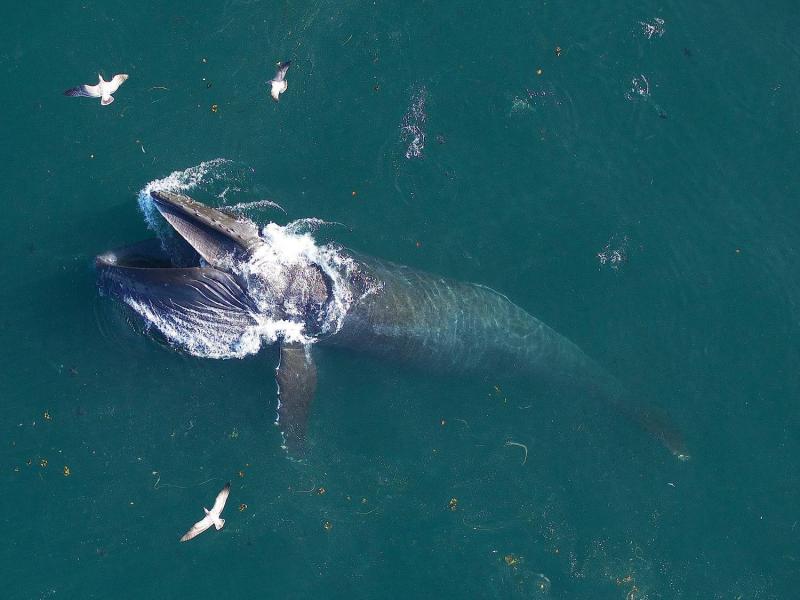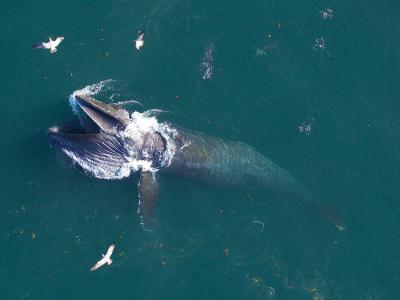Scientists have successfully held an unprecedented conversation with a humpback whale in its own language for a duration of 20 minutes. Researchers also hope to replicate this work with other intelligent animals on Earth, such as carnivores and elephants, opening the door to communication between humans and extraterrestrial beings.
In a recent study published in the journal PeerJ, scientists from the University of California, Davis, the Alaska Whale Foundation, and SETI (Search for Extraterrestrial Intelligence) collaborated to communicate with whales. In a historic experiment, the team engaged in a 20-minute conversation with a humpback whale named "Tuwain" in its own language.
The details reveal that the scientists sailed off the coast of Alaska and played what is called a "contact call" into the ocean to see if any whales would respond. Contact calls are similar to human greetings. According to lead author Brenda McCowan, a professor at the UC Davis School of Veterinary Medicine, whales use these calls to summon other whales or to inform each other of their location. Co-author Fred Sharp, a lead researcher at the Alaska Whale Foundation, noted, "It's one of the most common signals in the social sound repertoire of the humpback whale."
As reported, the whale "Tuwain" swam towards the boat and circled around it. Over the next 20 minutes, the scientists emitted the same contact call 36 different times at varying intervals, with Tuwain responding each time. McCowan explained, "If the scientists waited 10 seconds before re-issuing the call to Tuwain, it would also wait 10 seconds before responding." She added that "this kind of matching interval indicates that Tuwain was engaged in deliberate exchange."
Sharp told Business Insider, "We definitely felt like we were heard," emphasizing that their work is conducted under the authorization of the National Oceanic and Atmospheric Administration. He cautioned readers not to attempt this at home (or at sea)... and hopes they experience the same feeling.
In a statement, McCowan mentioned, "We believe this is the first communicative exchange of its kind between humans and humpback whales in whale language." Calls from the humpback whales were recorded by researchers from a small group of whales the day before the encounter. The group included Tuwain, hence it is possible that Tuwain was responding to its own signals, with Sharp commenting, "We might have been returning a greeting to her."
### Speaking with Extraterrestrial Beings
Lawrence Doyle, the lead researcher at the SETI Institute and co-author of the paper, noted that Tuwain's behavior might closely resemble how intelligent extraterrestrial species would seek to communicate with humanity. Doyle stated in a release that a key assumption in the search for extraterrestrial intelligence is that alien beings would be interested in making contact, targeting human receivers "in much the same way that Tuwain responded to scientists' contact calls."
Doyle and his colleagues at SETI are working with whale and animal experts at UC Davis and the Alaska Whale Foundation to create intelligent filters to aid in their search for extraterrestrial intelligence. Doyle told Business Insider, "If there are extraterrestrial beings sending us signals and trying to communicate, we might miss them if we don’t know what we’re looking for." By perfecting these intelligent filters, scientists could potentially identify intelligent signals from space in an attempt to make the first contact with extraterrestrial life.
McCowan expressed, "There are diverse intelligences on this planet, and by studying them, we can better understand what extraterrestrial intelligence might be like, as it won’t be exactly like our intelligence." Doyle further stated that the research also tests the notion of whether intelligent extraterrestrial life would seek us out. He added, "Whale research indicates that if you are intelligent, curiosity comes with that, and you want to make contact."
Scientists hope that similar work can be conducted with other intelligent animals on Earth, including other cetaceans like dolphins, carnivores that cooperate in hunting, and other highly social species such as meerkats and elephants.




